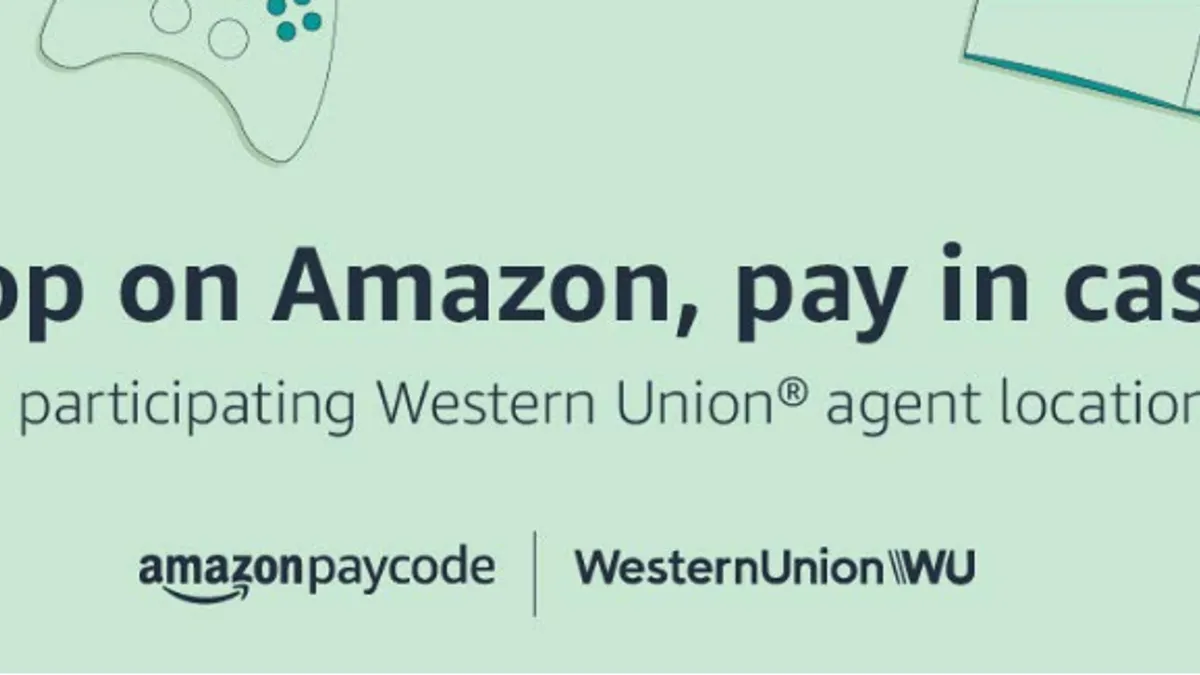Dive Brief:
-
Amazon on Wednesday said that for the first time, U.S. customers can pay with cash through 15,000 Western Union locations nationwide. Dubbed Amazon PayCode, the service has been available in 19 other countries, according to a company press release.
-
The no-fee transaction allows a customer to choose "Amazon PayCode" at checkout and bring payment to a participating Western Union location within 24 hours. A QR code and number provided at checkout tracks the purchase for the payment and free returns, also conducted through the Western Union stores once Amazon receives the return.
-
Also on Wednesday, the e-commerce giant said it has expanded its Amazon Cash service, first piloted two years ago, to more than 100,000 locations nationwide (including Western Union, CVS, Rite Aid, GameStop and 7-Eleven stores). Through that service, also free, shoppers use cash to load between $5 and $500 to an Amazon balance that can be used to make a purchase online at Amazon.
Dive Insight
E-commerce, conducted as it is in the digital ether, is a cash-free zone. The Amazon Go store is an innovation that brings the smooth no-cash transactions of online shopping to brick and mortar, built on the promise of alleviating one of the most frustrating aspects of shopping — waiting in line to pay.
The PayCode and Amazon Cash processes may seem convoluted, but they bring cold hard cash, which remains the default currency of many consumers, to e-commerce. In its release on the expansion of its cash services in the U.S., Amazon referred to a Federal Reserve Bank of San Francisco report that in 2018, 77% of payments in the U.S. were made in person, and that cash changed hands for 39% of them.
For many Americans, it's more than a preference; while some avoid banks due to privacy or political concerns, others don't make enough money to maintain a balance. A survey from the Federal Deposit Insurance Corporation (the independent agency created by Congress to insure bank deposits) found that in 2017 6.5% of U.S. households or about 8.4 million were "unbanked" in 2017, with no account at an insured financial institution.
Another 18.7% (24.2 million households) were "underbanked," meaning that the "household had a checking or savings account but also obtained financial products and services outside of the banking system," according to the report.
These no-fee services may help them — Amazon says that 80% of Americans live within five miles of a participating Western Union — but they also serve Amazon in a couple of ways. First, they allow Amazon to expand its customer base beyond its well-to-do Prime members to reach the less wealthy consumers more likely to shop at Walmart (which has long provided cash alternatives to people with less access to banking services).
Second, it's a defensive play against public policy that could undermine its Amazon Go ambitions of opening some 3,000 locations in the next few years. Moving to protect the underbanked, cities and states across the country have enacted or are mulling bans on cashless stores, including Philadelphia, San Francisco, Washington D.C., New York and New Jersey. Massachusetts for more than 40 years has required businesses to accept cash.
In May, Amazon's new Go store in New York was the first to accept cash as payment.
















